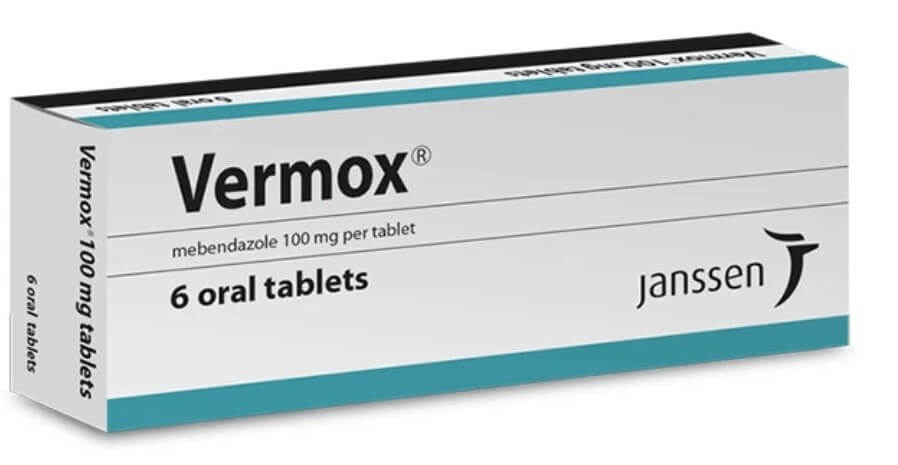Vermox (
generic name: mebendazole) is an
anthelmintic medication used to treat various
parasitic worm infections. It is effective against
pinworm (Enterobius vermicularis),
roundworm (Ascaris lumbricoides),
whipworm (Trichuris trichiura), and
hookworm (Ancylostoma duodenale and Necator americanus). Mebendazole works by inhibiting the worms’ ability to absorb glucose, leading to their depletion of energy and eventual death. This action helps eliminate the parasites from the body.
Mebendazole belongs to the benzimidazole class of drugs, which is known for its broad-spectrum activity against intestinal helminths. By disrupting the microtubule function in the parasites, it effectively immobilizes and kills them, ensuring that the worms are expelled from the gastrointestinal tract.
It’s important to note that while mebendazole effectively kills adult worms, it may not eradicate the eggs. Therefore, maintaining good hygiene practices, such as regular handwashing, daily bathing, and frequent changing of bed linen and underwear, is essential to prevent reinfection and the spread of the parasites.
Dosage
The prescribing doctor determines the dosage, which depends mainly on the type of infection. The choice of tablet or suspension will be based on which is easier to take. 5 ml of suspension contains the same dose of mebendazole as one tablet.
Usual Dosage
- Pinworm (E. vermicularis): A single dose of 100 mg is administered. Due to the high risk of reinfection, it is often recommended to repeat the dose after two and four weeks to ensure complete eradication.
- Roundworm (A. lumbricoides), whipworm (T. trichiura), and hookworm (A. duodenale and N. americanus): 100 mg taken twice daily (morning and evening) for three consecutive days.
Vermox tablets can be chewed, swallowed whole, or crushed and mixed with food. If a dose is missed, it should be taken as soon as remembered unless it is almost time for the next dose; in such cases, skip the missed dose and resume the regular schedule. Do not double-dose to make up for a missed dose.
Storage
Store Vermox at room temperature, below 30°C (86°F), away from moisture and heat. Keep the medication in its original container, tightly closed, and out of reach of children. Do not use the medication after the expiration date indicated on the package.
For more information, read our article on drug storage.
Questions About Vermox
Are there any medications that interact with Vermox?
Yes, certain medications can interact with Vermox. For example, taking metronidazole (Flagyl) with Vermox can cause a severe skin reaction. Always inform your healthcare provider about all the medications you are taking to avoid potential interactions.
What precautions should I take while using mebendazole?
Inform your healthcare provider if you have liver disease, inflammatory bowel disease, or any allergies. Avoid using mebendazole with metronidazole (e.g.
Flagyl) due to the risk of severe skin reactions. Additionally, maintain good hygiene practices to prevent reinfection.
Can I take Vermox during pregnancy?
The safety of Vermox during pregnancy is not well established. It’s important to inform your healthcare provider if you are pregnant, plan to become pregnant, or are breastfeeding before taking this medication
This text is for informational purposes only. Please consult a doctor or pharmacist before using any medication.
Read the information leaflet that comes with the medication.
Most people who use Vermox do not experience any adverse side effects. Doctors prescribe this medication because they assess the benefits of such treatment outweigh any likely unwanted effects.
If a sudden allergic reaction, such as swelling of the face, tongue, or throat that makes it difficult to breathe or swallow, wheezing, hives, rash, or severe sloughing of the skin, occurs, stop using Vermox and report to a doctor immediately, or call 911 and go to an emergency room.
Some of the side effects that have been reported include:
- abdominal pain or discomfort
- diarrhea
- flatulence
- nausea or vomiting.
Not all side effects are listed here. If these or other unlisted symptoms persist or worsen, consult a healthcare provider or pharmacist.
Vermox is approved for the treatment of several intestinal worm infections:
- Pinworm (Enterobius vermicularis): A common parasitic infection, especially in children, characterized by itching around the anus, disturbed sleep, and irritability.
- Roundworm (Ascaris lumbricoides): Infection can lead to abdominal discomfort, cough, and, in severe cases, intestinal blockage.
- Whipworm (Trichuris trichiura): May cause gastrointestinal symptoms such as diarrhea, abdominal pain, and, in heavy infections, can lead to anemia and growth retardation in children.
- Hookworm (Ancylostoma duodenale and Necator americanus): Infections can result in gastrointestinal issues, anemia due to blood loss, and nutritional deficiencies.
In some cases, Vermox is also used off-label to treat other parasitic infections, such as certain types of tapeworms. However, its efficacy for these conditions may vary, and alternative treatments are often preferred.










